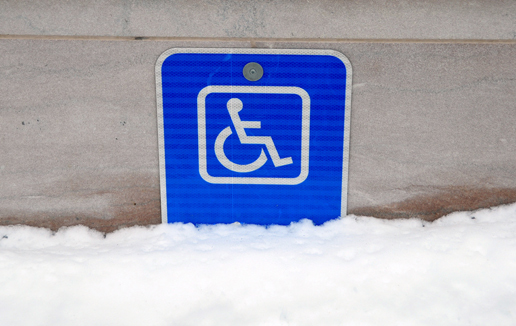
With many parts of the U.S. already hit with significant snowfall this winter, disability advocates can take some relief in U.S law, even as practical challenges remain.
The Americans with Disabilities Act (ADA) mandates that snow or other debris in accessible parking spaces and access aisles be removed as soon as possible. “Debris” also includes items like shopping carts, trash cans, potted plants, seasonal garden displays, bicycle racks and wheelstops. The presence of such obstacles almost certainly cuts into the 96-inch width the ADA requires of all accessible parking spaces.
Private drives, except in cases where the government already clears residences with non-disabled tenants, are excluded from the winter weather rule.
Certain states have their own laws regarding the removal of snow and ice. New Jersey, for example, requires the removal of winter precipitation within 48 hours of the weather event, with penalties ranging from $200 to $500 for non-compliance.
For people with disabilities living in colder climes, snowstorms in particular pose a major problem. Minnesota Public Radio chronicled the fate of the state’s citizens with disabilities after a snowstorm in 2010. One man described the difficulty in the wake of extreme weather:
“A snowy, icy winter makes the difficult life of a disabled person more difficult. I think the loss of independence, personal efficacy and human interaction is the hardest part for me.”
Minnesota, frequently hit by severe winter weather, advises its residents with disabilities to take “extra precautions” during the coldest months. These include preparing an emergency kit with extra provisions of warm clothing, blankets, food, and other necessities.
Do you know of a business that has violated these or other ADA laws? Contact us so we may advocate with you!
Image courtesy of Flickr, Kevin H.
